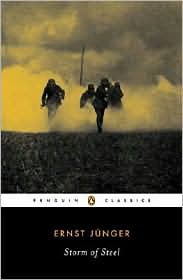
This was the most bizarrely apolitical, and in a way amoral, war memoir or novel I've ever read. By that I mean not only that it makes no judgment but also that it provides no context. As a reader you don't get any impression of the war as a whole or the reasons for fighting or the progression of the battles. What's more, the writing is so incredibly unemotional--Jünger seems much more interested in describing the war than responding to it, mentioning his feelings only in passing--that reading the book becomes disturbing for that reason in addition to the graphic descriptions of war. On entering the town of Combles:
Over the ruins, as over all the most dangerous parts of the terrain, lay a heavy smell of death, because the fire was so intense that no one could bother with the corpses. You really did have to run for your life in these places, and when I caught the smell of it as I ran, I was hardly surprised--it belonged to there. Moreover, this sweetish was not merely disgusting; it also, in association with the piercing fogs of gunpowder, brought about an almost visionary excitement, that otherwise only the extreme nearness of death is able to produce.
[ . . . ]
After breakfast, I took a little look around the place. In the course of a very few days heavy artillery had transformed a peaceable town in the hinterland to the image of dread. Whole houses had been flattened or ripped apart by shells, so that the rooms and their furnishings were left hanging over the chaos like theater flats. The smell of corpses oozed from some buildings, because the first abrupt assault had taken the inhabitants by surprise, and buried many of them in the ruins before they could leave their dwellings. On one doorstep lay a little girl, stretched out in a lake of crimson.
The smells and sounds of war, the sweetness of rotting bodies and the lingering scent of gas, the sound of shells and whistling bullets, pervade the book. As do the names of Jünger's comrades. A constant litany of the honorable dead runs through the narrative. It's a memorial and in that sense perhaps a noble undertaking. But the book itself is less noble than a document that glorifies a terrible thing.
 This was the most bizarrely apolitical, and in a way amoral, war memoir or novel I've ever read. By that I mean not only that it makes no judgment but also that it provides no context. As a reader you don't get any impression of the war as a whole or the reasons for fighting or the progression of the battles. What's more, the writing is so incredibly unemotional--Jünger seems much more interested in describing the war than responding to it, mentioning his feelings only in passing--that reading the book becomes disturbing for that reason in addition to the graphic descriptions of war. On entering the town of Combles:
This was the most bizarrely apolitical, and in a way amoral, war memoir or novel I've ever read. By that I mean not only that it makes no judgment but also that it provides no context. As a reader you don't get any impression of the war as a whole or the reasons for fighting or the progression of the battles. What's more, the writing is so incredibly unemotional--Jünger seems much more interested in describing the war than responding to it, mentioning his feelings only in passing--that reading the book becomes disturbing for that reason in addition to the graphic descriptions of war. On entering the town of Combles:
No comments:
Post a Comment